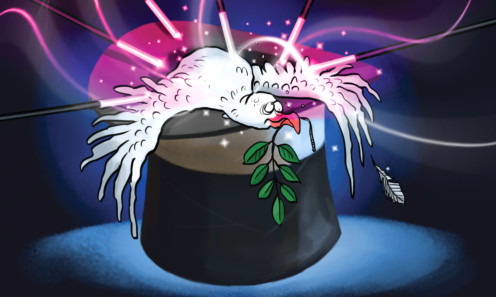
In essence, no one really wants to go to the proposed peace conference on Syria, dubbed Geneva II, scheduled to be held in the Swiss city of Montreux on January 22. The regime of President Bashar Al Assad will attend if only to prove that it is still the legitimate government of the Syrian people. Apart from anything else, it will recognise only one item on the agenda: Fighting terrorism. And if forced to accept the principle of the formation of a transitional government, as the first Geneva meeting in June 2012 recommended, then it will suggest going back to the Syrian people first. The Saudis, Qataris and Turks want the meeting to conclude that Al Assad’s time in power is up and that he should not be part of the transitional phase — something that the Syrian delegation will never accept or talk about. France and the United Kingdom, to a certain extent, support this position.
The opposition is more divided than ever. It does not see any benefit from attending the conference. A large bloc within the Syrian National Coalition (SNC) has already decided to boycott the meeting. However, its leadership cannot afford to be marginalised if it does not show up. Furthermore, the core purpose of the United Nations-backed conference is to set up a political process involving the regime and the opposition.
Russia and the US, the two main facilitators of the conference, agree that the only way out of the three-year Syrian crisis, which has claimed more than 130,000 lives so far, is a political solution. Moscow is a major supporter of the Al Assad regime and is against any interference in its affairs. The US position is enigmatic. It backs a political deal, but is unsure about the fate of Al Assad.
And then there is Iran, the most important ally of Damascus, which so far has not been invited to Geneva II. US Secretary of State John Kerry and Russia’s Foreign Minister Sergey Lavrov will meet next week to decide on a number of issues relating to Syria, including Iran’s possible participation.
In addition to the political players, there are the combatants on the ground — tens of rebel fronts and factions that have been fighting the regime and making progress in some areas while being repulsed in others. Few support Geneva II or a political deal with the regime, but to the Damascus government, they are all part of a foreign-backed terrorist plot to destabilise the country. They have no place on the negotiating table even if they wanted to.
Currently, there are a number of possible scenarios. One, Geneva II will be held, but will collapse after the opening statements. The US and Russia are yet to agree on a workable road map that will appeal to all sides — an almost impossible task. Two, the conference could go on for few more days, but both the regime and the opposition will not be able to bridge the vast gap separating them. And three, the two sides, under pressure, will agree on the principle of forming a transitional government, leaving the details to future discussions and consultations.
In all cases, Geneva II will not be the magic venue where improbable solutions are found. Syria’s is a complicated conflict with many foreign parties playing contentious roles. The regime wants to convince the world that it is not dealing with a local uprising, but a regional conspiracy. It wants to prove to the world that it is fighting terrorism, in the form of Islamist jihadism, just as in Iraq, Egypt, Algeria and other areas.
The opposition in exile has a number of challenges. It has to prove to the world that it does represent the Syrian people and that the majority of Syrians want regime change and a new political system that is built on democratic ideals, pluralism and a civil state. But the mantras of most rebel groups fighting the regime betray these ideals. Most of the groups and alliances fighting the regime today want to establish an Islamist state in Syria. Most are infiltrated by Arab and other jihadists and few are directly associated with Al Qaida.
The internal opposition is passive and intimidated by the regime. And by refusing to recognise the opposition in exile, the Damascus government now claims that it has no partner to talk to. The most likely scenario is that there will be a timid political process going on, but the fighting on the ground will continue.
The current fratricidal infighting between so called moderate groups and extremist fighters belonging to the Islamic State in Iraq and Syria (ISIS) is a boon to the Al Assad government, but it can also signal an attempt to banish radical fighters, associated with Al Qaida, in order to unite the remaining groups ahead of Geneva II.
The regime has never looked stronger and more confident. In fact, it appears that it is the only party to the conflict that is actually excited about going to Geneva. At worst, it will be able to solidify its legitimacy as a player holding the winning cards.
Osama Al Sharif is a journalist and political commentator based in Amman.









